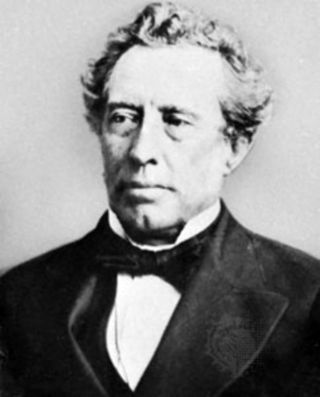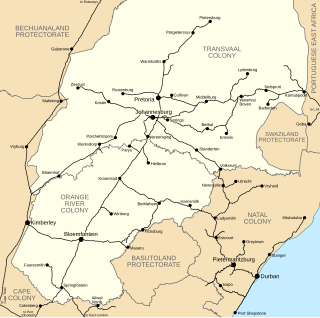| |||||||||
| Decades: | |||||||||
|---|---|---|---|---|---|---|---|---|---|
| See also: | |||||||||
The following lists events that happened during 1856 in South Africa .
| |||||||||
| Decades: | |||||||||
|---|---|---|---|---|---|---|---|---|---|
| See also: | |||||||||
The following lists events that happened during 1856 in South Africa .

The Anglo-Zulu War was fought in present-day South Africa from January to early July 1879 between forces of the British Empire and the Zulu Kingdom. Two famous battles of the war were the Zulu victory at Isandlwana and the British defence at Rorke's Drift.

The Orange Free State was an independent Boer-ruled sovereign republic under British suzerainty in Southern Africa during the second half of the 19th century, which ceased to exist after it was defeated and surrendered to the British Empire at the end of the Second Boer War in 1902. It is one of the three historical precursors to the present-day Free State province.
NATAL or Natal may refer to:

The Boer republics were independent, self-governing republics formed by Dutch-speaking inhabitants of the Cape Colony and their descendants. The founders – variously named Trekboers, Boers, and Voortrekkers – settled mainly in the middle, northern, north-eastern and eastern parts of present-day South Africa. Two of the Boer republics achieved international recognition and complete independence: the South African Republic and the Orange Free State. The republics did not provide for the separation of church and state, initially allowing only the Dutch Reformed Church, and later also other Protestant churches in the Calvinist tradition. The republics came to an end after the Second Boer War of 1899–1902, which resulted in British annexation and later incorporation of their lands into the Union of South Africa.

Cetshwayo kaMpande was the king of the Zulu Kingdom from 1873 to 1884 and its Commander in Chief during the Anglo-Zulu War of 1879. His name has been transliterated as Cetawayo, Cetewayo, Cetywajo and Ketchwayo. Cetshwayo consistently opposed the war and sought fruitlessly to make peace with the British and was defeated and exiled following the Zulu defeat in the war. He was later allowed to return to Zululand, where he died in 1884.

Dinuzulu kaCetshwayo was the king of the Zulu nation from 20 May 1884 until his death in 1913. He succeeded his father Cetshwayo, who was the last king of the Zulus to be officially recognised as such by the British. Zululand had been broken up into thirteen smaller territories by the British government after the Anglo-Zulu War, and Cetshwayo, and subsequently Dinuzulu, administered one of them. The British later realised the futility of breaking up Zululand into the territories and restored Cetshwayo as paramount leader of the territories. However, they left one of Cetshwayo's relatives, Usibepu (Zibhebhu), alone with his lands intact. On 22 July 1883, Usibepu attacked Cetshwayo's new kraal in Ulundi, wounding the king and causing him to flee.

Sir Theophilus Shepstone was a British South African statesman who was responsible for the annexation of the Transvaal to Britain in 1877. Shepstone is the great great grandfather of international artist Conor Mccreedy.

The Natalia Republic was a short-lived Boer republic founded in 1839 after a Voortrekker victory against the Zulus at the Battle of Blood River. The area was previously named Natália by Portuguese sailors, due to its discovery on Christmas. The republic came to an end in 1843 when British forces annexed it to form the Colony of Natal. After the British annexation of the Natalia Republic, most local Voortrekkers trekked northwest into Transorangia, later known as the Orange Free State, and the South African Republic.
The Netherlands–South African Railway Company or NZASM was a railway company established in 1887. The company was based in Amsterdam and Pretoria, and operated in the South African Republic (ZAR) during the late 19th century. At the request of ZAR president Paul Kruger, the NZASM constructed a railway line between Pretoria and Lourenço Marques in Portuguese East Africa.
The following lists events that happened during 1879 in South Africa.
The following lists events that happened during 1878 in South Africa.
The following lists events that happened during 1901 in South Africa.
The following lists events that happened during 1884 in South Africa.

The Central South African Railways (CSAR) was from 1902 to 1910 the operator of public railways in the Transvaal Colony and Orange River Colony in what is now South Africa. During the Anglo-Boer War, as British forces moved into the territory of the Orange Free State and the South African Republic, the Orange Free State Government Railways, the Netherlands-South African Railway Company and the Pretoria-Pietersburg Railway were taken over by the Imperial Military Railways under Lieutenant-Colonel Sir Percy Girouard.

The King Cetshwayo Artillery Regiment is a reserve artillery regiment of the South African Army.

The Nieuwe Republiek was a small Boer republic which existed from 1884 to 1888 in present-day South Africa. It was recognised only by Germany and the South African Republic. Its independence was proclaimed on 16 August 1884, with land donated by the Zulu Kingdom through a treaty. It covered 13,600 square kilometres (5,300 sq mi) and the capital was Vryheid or Vrijheid, both being alternative names of the state. The founder and president until it requested incorporation into the South African Republic on 20 July 1888 was Lucas Johannes Meyer, while Daniel Johannes Esselen acted as Secretary of State during the same period.

The Queen's South Africa Medal is a British campaign medal awarded to British and Colonial military personnel, and to civilians employed in an official capacity, who served in the Second Boer War in South Africa. Altogether twenty-six clasps were awarded, to indicate participation in particular actions and campaigns.

The Zulu Kingdom, sometimes referred to as the Zulu Empire, was a monarchy in Southern Africa. During the 1810s, Shaka established a standing army that consolidated rival clans and built a large following which ruled a wide expanse of Southern Africa that extended along the coast of the Indian Ocean from the Tugela River in the south to the Pongola River in the north.

The South African Wars, including but also known as the Confederation Wars, were a series of wars that occurred in the southern portion of the African continent between 1879 and 1915. Ethnic, political, and social tensions between European colonial powers and indigenous Africans led to increasing hostilities, culminating in a series of wars and revolts, which had lasting repercussions on the entire region. A key factor behind the growth of these tensions was the pursuit of commerce and resources, both by countries and individuals, especially following the discoveries of gold in the region in 1862 and diamonds in 1867.
See Years in South Africa for list of References